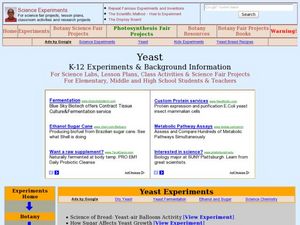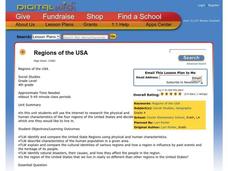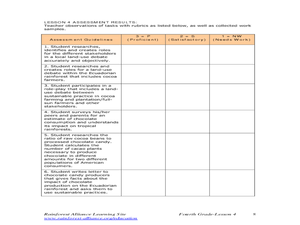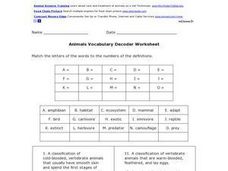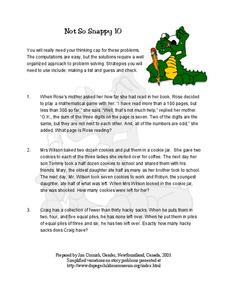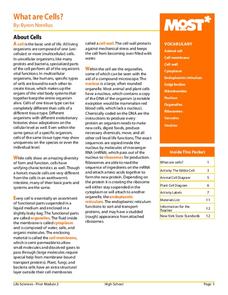Curated OER
Governance
Fourth graders recognize the need for governments of Saskatchewan Indian Tribes. In this government lesson, 4th graders understand the role of government in the development of Early Saskatchewa. Students create a flip book.
Curated OER
Soil in My Food Web
Fourth graders understand the importance of soil to the food web. In this food web lesson, 4th graders create various food webs beginning with soil using yarn and name cards. Students write about the importance of soil to one...
Curated OER
Yeast
Students study the characteristics of yeasts. In this biology lesson, students conduct experiments to measure yeast respiration. They discuss the favorable conditions needed for growing them.
Curated OER
Biotechnology, GMOs and Food
Twelfth graders explore controversy around genetically modified foods, identify source of controversy, and role play town hall meeting on genetically modified foods, to examine viewpoints and arguments for and against genetic modification.
Curated OER
The Price of Relief
Students calculate and graph the costs of essential items needed in Kosovar refugee camps on an individual, family, and camp basis. Additionally, students explore how relief organizations and businesses participate in relief efforts.
Curated OER
How Much Water?
Learners investigate amount of water available in different countries around the world, compare it to their daily water use, and explore how unequal distribution of water can cause challenges to survival. Students then discuss need to...
Curated OER
Seeing in 3D: Interpreting Two-Dimensional Diagrams of Three-Dimensional Objects
Students hone in on their skills at reading diagrams. In this dimensional lesson students collect information on the functions of organs then figure out how all the parts work together.
Curated OER
Rocks, Minerals, and Erosion
Students identify and describe rocks that contain records of the earth's history and explain how they were formed. They formulate questions about and identify needs and problems related to objects and events in the environment, and...
Curated OER
Outreach in the Aftermath
Students investigate types of aid needed to help Turkey recover and rebuild in the wake of a devastating earthquake on August 17, 1999. They create a plan for a fundraiser or project that they can do to offer assistance to victims of...
Curated OER
Kindergarten Exploration Tubs
Students identify their names as a symbol for themselves. They describe characteristics of organisms. They utilize tools to gather data and compare size.
Curated OER
Nutrition
Students create a video incorporating clay animation and skits. Using their video creation, students explain and explore the five basic food groups, nutrition news, nutrients, benefits and food examples. They maintain a food journal,...
Curated OER
Fraction Puzzle Problems
Fifth graders design a fraction word problem PowerPoint presentation. In small groups they complete a storyboard graphic organizer for their word problem, evaluate another group's word problem, and create a PowerPoint presentation of...
Curated OER
Technology: Recipes Around the World
Students research international cuisine and create Web pages based on them. Once they have organized their findings, they demonstrate their research with a multimedia presentation. The project concludes with a party using food ...
Curated OER
Leadership
Learning about leadership, and different styles can be an important step toward understanding government and local organizations. By participating in a survey to evaluate leadership styles, involving 60 questions, learners get a better...
Curated OER
Regions of the USA
Fourth graders research the physical characteristics of the four regions of the United States. In this geography lesson, 4th graders research the four regions and use a quilt square organizer to record notes. Students complete the quilt...
Curated OER
How can we keep our forests intact and have chocolate too?
Fourth graders recognize the need to sustain crops in the rainforest. In this rainforest lesson plan, 4th graders consider the use of products from the rainforest. Students discuss how people of different points of view decide...
Curated OER
Animals Vocabulary Decoder Worksheet
Add some decoding to your scholar's review of basic life science terms in this decorder instructional activity, where students match 15 words to their definitions. Words such as mammal and amphibian must be matched to their written...
Curated OER
Not So Snappy 10
In this math worksheet, students look for the answers to each word problem that is focused around the number 10. They use the basic skills of arithmetic.
Office of Migrant Education
Poetry: Form, Syllables, Mood, and Tone
Looking for a resource to introduce homeschoolers and other out-of-class learners to the elements of poetry? Check out this packet that defines and illustrates important poetry terms.
AAAS
Identification and Classification of Grassland Plants
Take learning outside and start classifying grasslands. Young ecologists observe grassland plants in order to classify them into the appropriate species by family. They note their characteristics and where they grow. A true...
iCivics
The Fourth Branch: You!
Take time to remind your young learners of the valuable understanding that each branch of the United States government is really composed of other citizens. The reading material and worksheets of this resource cover the importance of...
Curated OER
What Are Cells?
Energize the cells of young biologists with an edible life science activity. Engaging students in exploring the inner workings of plant and animal cells, this activity involves using colored jello and various sweet and...
Curated OER
Insects A-Z!
Alphabet insects! Who has ever heard of such a thing? Get ready because your class is going to research insects that start with a specific letter of the alphabet. In small groups, they'll use the Internet and reference texts to locate...
Curated OER
Nonfiction Genre Mini-Unit: Persuasive Writing
Should primary graders have their own computers? Should animals be kept in captivity? Young writers learn how to develop and support a claim in this short unit on persuasive writing.


